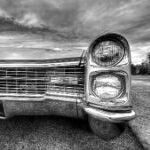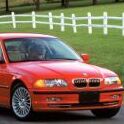The Volkswagen diesel emission scandal has given many a black eye. Robert Bosch GmbH, a supplier of diesel engine technology was one of those as it found itself under investigation by German authorities to see whether or not it aided and abetted in the scandal. The company also had to pay out $327.5 million as part of a settlement in the U.S. But the company isn't giving up on diesel just yet.
This week at the Bosch’s annual press conference, CEO Dr. Volkmar Denner claimed they had found “decisive breakthrough in diesel technology.” The technology in question is said to reduce nitrogen (NOx) emission levels to just one-tenth of the European legal limits coming in 2020.
"Combustion engines — whether powered by diesel or gasoline — will soon emit so little in the way of particulates and nitrogen oxides that they will have no significant impact on the air," said Denner.
Details about the technology are somewhat thin. In the press release, Bosch said it is comprised of a “combination of advanced fuel-injection technology, a newly developed air management system and [an] intelligent temperature management [system].” The last item is interesting as it uses artificial intelligence to change the temperature. This new technology can be integrated into production without raising the costs.
"After this ecological rehabilitation, diesel can take off again. It is not combustion engines that are being made obsolete, but rather the debate about their imminent demise," said Denner.
Yet we can't help but think this is too little too late. With bans on diesel vehicles being considered and automakers beginning to turn their focus on to other alternatives such as hydrogen and electric, this new technology for diesel may be left in the dust.
Source: Bosch
Breakthrough: new Bosch diesel technology provides solution to NOx problem
- Bosch CEO Denner also calls for transparency on fuel consumption and CO2 emissions
- Unprecedented emissions: NOx 10 times lower than limits set for 2020
- New Bosch technology retains advantage with regard to fuel consumption and environmental impact
- Denner: “There’s a future for diesel. Soon, emissions will no longer be an issue.”
- Internal combustion engines equipped with artificial intelligence have almost zero impact on air quality
- Appeal to politicians: fuel consumption should be measured on the road and emissions analyzed from well to wheel
Stuttgart and Renningen, Germany: “There’s a future for diesel. Today, we want to put a stop, once and for all, to the debate about the demise of diesel technology.” It was with these words that the Bosch CEO Dr. Volkmar Denner, speaking at the company’s annual press conference, announced a decisive breakthrough in diesel technology. New developments from Bosch could enable vehicle manufacturers to reduce emissions of nitrogen oxides (NOx) so drastically that they already comply with future limits. Even in RDE (real driving emissions) testing, emissions from vehicles equipped with the newly premiered Bosch diesel technology are not only significantly below current limits but also those scheduled to come into force from 2020. Bosch engineers achieved these results by refining existing technologies. There is no need for additional components, which would drive up costs. “Bosch is pushing the boundaries of what is technically feasible,” Denner said. “Equipped with the latest Bosch technology, diesel vehicles will be classed as low-emission vehicles and yet remain affordable.” The Bosch CEO also called for greater transparency with regard to the CO2 emissions caused by road traffic, and called for fuel consumption and thus CO2 emissions to be also measured under real conditions on the road in the future.
Record readings under real driving conditions: 13 mg NOx per kilometer
Since 2017, European legislation has required that new passenger car models tested according to an RDE-compliant mix of urban, extra-urban, and freeway cycles emit no more than 168 milligrams of NOx per kilometer. As of 2020, this limit will be cut to 120 milligrams. But even today, vehicles equipped with Bosch diesel technology can achieve as little as 13 milligrams of NOx in standard legally-compliant RDE cycles. That is approximately one-tenth of the prescribed limit that will apply after 2020. And even when driving in particularly challenging urban conditions, where test parameters are well in excess of legal requirements, the average emissions of the Bosch test vehicles are as low as 40 milligrams per kilometer. Bosch engineers have achieved this decisive breakthrough over the past few months. A combination of advanced fuel-injection technology, a newly developed air management system, and intelligent temperature management has made such low readings possible. NOx emissions can now remain below the legally permitted level in all driving situations, irrespective of whether the vehicle is driven dynamically or slowly, in freezing conditions or in summer temperatures, on the freeway or in congested city traffic. “Diesel will remain an option in urban traffic, whether drivers are tradespeople or commuters,” Denner said.
Bosch delivered proof of this innovative advance at a major press event in Stuttgart. Dozens of journalists, from both Germany and abroad, had the opportunity to drive test vehicles equipped with mobile measuring equipment in heavy city traffic, under especially challenging conditions. The results recorded by the journalists, along with the route driven, can be viewed here. As the measures to reduce NOx emissions do not significantly impact consumption, the diesel retains its comparative advantage in terms of fuel economy, CO2 emissions, and therefore climate-friendliness.
Artificial intelligence can further boost combustion engines’ performance
Even with this technological advance, the diesel engine has not yet reached its full development potential. Bosch now aims to use artificial intelligence to build on these latest advances. This will mark another step toward a major landmark: the development of a combustion engine that – with the exception of CO2 – has virtually no impact on the ambient air. “We firmly believe that the diesel engine will continue to play an important role in the options for future mobility. Until electromobility breaks through to the mass market, we will still need these highly efficient combustion engines,” Denner said. His ambitious target for Bosch engineers is the development of a new generation of diesel and gasoline engines that produce no significant particulate or NOx emissions. Even at Stuttgart’s Neckartor, a notorious pollution black spot, he wants future combustion engines to be responsible for no more than one microgram of NOx per cubic meter of ambient air – the equivalent of one-fortieth, or 2.5 percent, of today’s limit of 40 micrograms per cubic meter.
Bosch wants to go further: transparency and realistic testing for consumption and CO2
Denner also called for a renewed focus on CO2 emissions, which are directly related to fuel consumption. He said that consumption tests should no longer be conducted in the lab but rather under real driving conditions. This would create a system comparable to the one used for measuring emissions. “That means greater transparency for the consumer and more focused climate action,” Denner said. Moreover, any assessment of CO2 emissions should extend significantly further than the fuel tank or the battery: “We need a transparent assessment of the overall CO2 emissions produced by road traffic, including not only the emissions of the vehicles themselves but also the emissions caused by the production of the fuel or electricity used to power them,” Denner said. He added that a more inclusive CO2 footprint would provide drivers of electric vehicles with a more realistic picture of the impact of this form of mobility on the climate. At the same time, the use of non-fossil fuels could further improve the CO2 footprint of combustion engines.
Product development code: ethical technology design
Denner, who also has corporate responsibility for research and advance engineering, presented Bosch’s product development code to the general public. This lays down the company’s principles for the development of Bosch products. First, the incorporation of functions that automatically detect test cycles is strictly forbidden. Second, Bosch products must not be optimized for test situations. Third, normal, everyday use of Bosch products should safeguard human life as well as conserve resources and protect the environment to the greatest possible extent. “In addition, the principle of legality and our ‘Invented for life’ ethos guide our actions. If in doubt, Bosch values take precedence over customers’ wishes,” Denner said. Since mid-2017, for example, Bosch has no longer been involved in customer projects in Europe for gasoline engines that do not involve the use of a particulate filter. A total of 70,000 associates, mainly from research and development, will receive training in the new principles by the end of 2018, as part of the most extensive training program in the company’s more than 130-year history.






-3707742431.jpg.06edf8e14f4ccf35c60d4774a543cc11.jpg)


Recommended Comments
Join the conversation
You can post now and register later. If you have an account, sign in now to post with your account.
Note: Your post will require moderator approval before it will be visible.